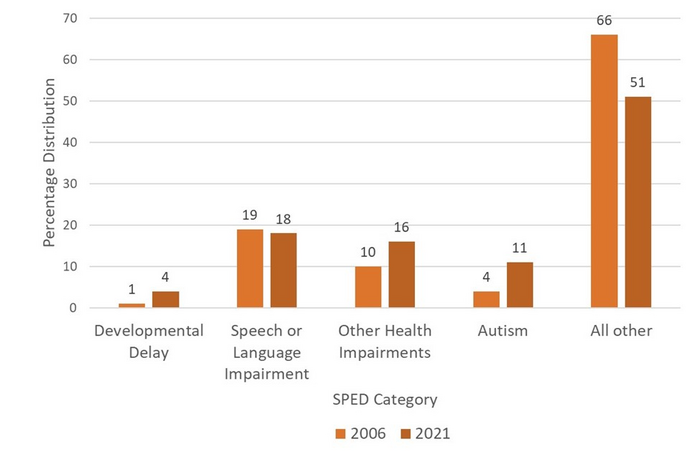Poor Nutrition, Heavy Metals in Food Blamed for 'Alarming' Increase in Autism, ADHD
Children can't learn? Poor nutrition may be to blame.

Researchers are pinpointing heavy metals exposure and poor nutrition as potential factors in an "alarming" increase in the number of children requiring special education services because of autism, ADHD and other impairments.
The number of children ages 6-21 in the United States receiving special education services increased 10.4% from 2006 to 2021. Children receiving special education services under the autism category increased 242% during the same period, according to a study published in PubMed.

A research team led by Dr. Renee Dufault of the Food Ingredient and Health Research Institute, conducted a literature review to help identify the causes of the increases.
They found that, over the last ten years, clinical trial data indicate dietary heavy metal exposures and poor nutrition are the primary factors impacting gene behavior and the inheritance of autism and/or ADHD in children.
Prenatal consumption of ultra-processed foods results in poor nutrition and exposures to heavy metals which adversely impact infant gene behavior before and after birth, they said.
Dufault has led research into the problem since 2005 when she first identified the problem of inorganic mercury residues in high fructose corn syrup while working at the Food and Drug Administration.
Heavy metals
Heavy metal residues are known to be a problem in the food supply. Exposure to toxic heavy metals causes permanent decreases in IQ, diminished future economic productivity, and increased risk of future criminal and antisocial behavior in children.
Congress released two reports in 2021 on the problem of heavy metals in baby foods. The first report issued on February 4, 2021, revealed baby foods are tainted with dangerous levels of arsenic, lead, cadmium, and mercury.
That study found that lead was present in baby foods made by all responding companies, including:
• Nurture (HappyBABY) sold finished baby food products that tested as
high as 641 ppb lead. Almost 20% of the finished baby food products that
Nurture tested contained over 10 ppb lead.
• Beech-Nut used ingredients containing as much as 886.9 ppb lead. It used
many ingredients with high lead content, including 483 that contained
over 5 ppb lead, 89 that contained over 15 ppb lead, and 57 that contained
over 20 ppb lead.
• Hain (Earth’s Best Organic) used ingredients containing as much as 352
ppb lead. Hain used many ingredients with high lead content, including
88 that tested over 20 ppb lead and six that tested over 200 ppb lead.
• Gerber used ingredients that tested as high as 48 ppb lead; and used many
ingredients containing over 20 ppb lead.
The second report, issued on September 29, 2021, confirmed new disclosures from manufacturers show dangerous levels of heavy metals in even more baby foods.
That report found, among other developments that in 2018, Walmart took a "giant step backwards" in protecting babies from toxic heavy metals. For six years, Walmart set an internal maximum inorganic arsenic limit of 23
ppb (parts per billion) for its finished baby foods. However, in 2018, Walmart abandoned that standard, more than quadrupling it to a standard allowing 100 ppb inorganic arsenic in its baby foods. Walmart offered no justification for its "extreme course reversal" on protecting babies’ neurological development.
Besides its fiindings, the U.S. House Subcommittee on Economic and Consumer Policy Committee on Oversight and Reform issued several recommendations, including requiring manufacturers to test their finished products.
It also recommended that the U.S. Food and Drug Administration (FDA) should move up its timeline for increased testing and oversight of packaged infant foods.
